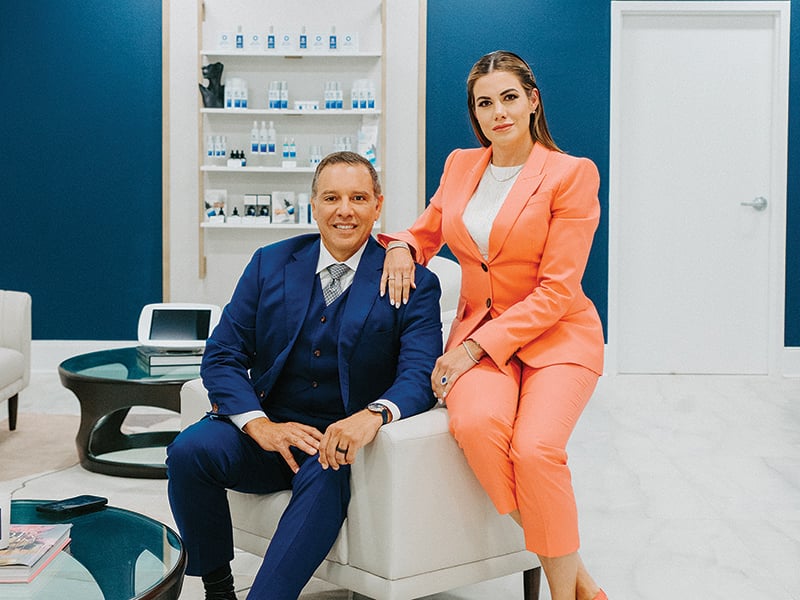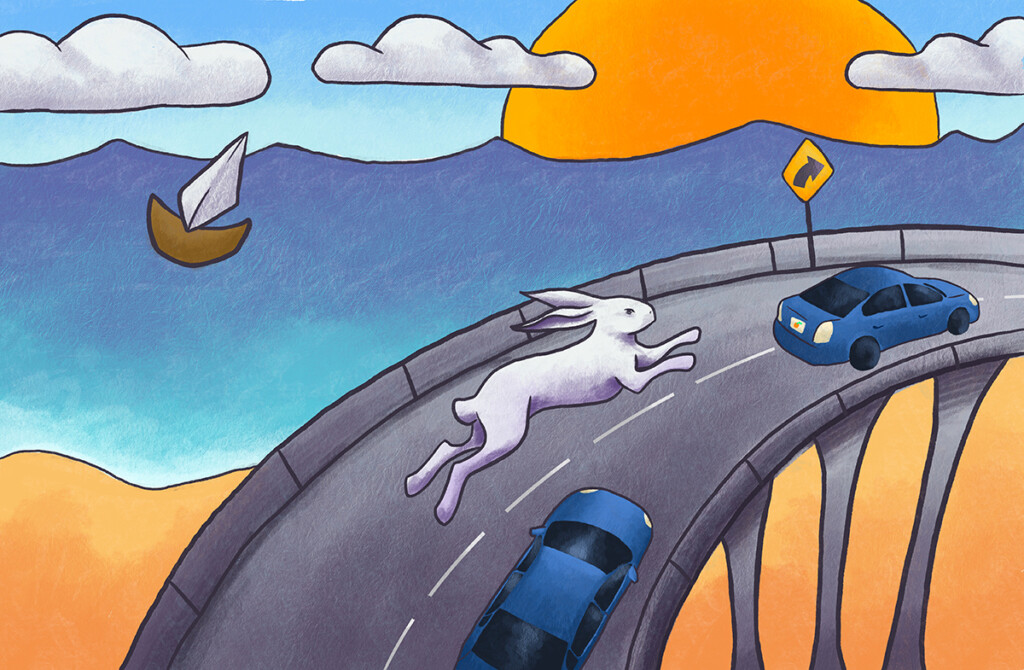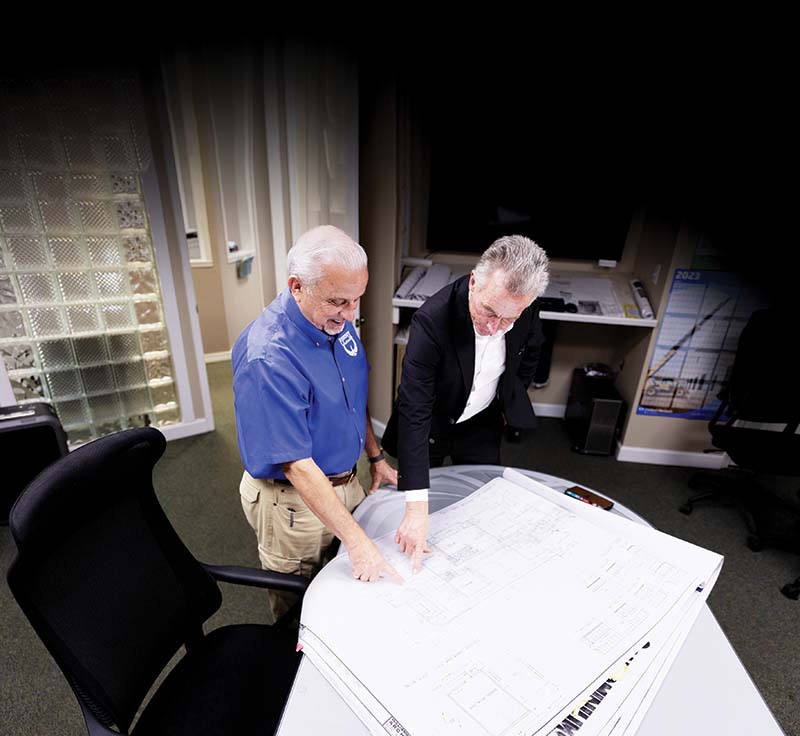Roads to Success
Contractors show public agencies the way

Assume that a heat dome has parked itself over Tallahassee and surrounding areas. High temperatures have exceeded 100 degrees for a week. The demand for power has become so great that outages are becoming a problem. Hospitals are overflowing with cases of heat stroke and heat exhaustion. Hallways are being staged as makeshift emergency rooms. People without shelter are dying on the streets.
How would you address that crisis?
The scenario was run by Tina Vidal-Duart and Carlos Duart, Miami-born entrepreneurs who moved to Tallahassee as a result of the COVID-19 pandemic. Together, they oversee the CDR Companies.
Notably, Vidal-Duart is the CEO at CDR/Health, a health care services contractor whose strengths include meeting community needs during crises or following natural disasters.
CDR/Health emerged as a go-to player during the pandemic in several states. Vidal-Duart served as the CEO of Florida’s COVID-19 Infectious Disease Field Hospital System. After the hospitals were demobilized, she was instrumental in helping CDR/Health’s COVID-19 test site logistics team deploy a call center; develop software that facilitated the patient experience from registration through result delivery; and launch a proprietary vaccination data management system.

On Sept. 7, CDR Emergency Management was tasked by the Florida Division of Emergency Management with standing up a 100-person base camp at a sports complex in Mayo, Florida. The camp served as a headquarters for volunteers and mutual aid crews working in response to Hurricane Idalia. CDR Emergency Management got to work on Sept. 8 and the base camp became operational two days later. Photo courtesy of CDR Health
Carlos Duart is the president/CEO at CDR/Maguire Engineering, a heavy infrastructure firm whose work is confined to large state and federal projects such as interstate highway construction and reconstruction. He also advises the management team at CDR/Emergency Management, a disaster-response company that has helped communities recover from hurricanes, tornadoes, floods and fires. Like CDR/Health, it was involved with several states in combating COVID-19.
If a community were overtaken by locusts, CDR/EM likely could develop an action plan. But what of the Tallahassee heat-dome scenario?
Vidal-Duart and Duart fielded the question immediately and with specifics.
“I would take all those empty Kroger buildings in SouthWood and bring in the one thousand hospital beds that we have in warehouses in various parts of the state and open an alternative care site to relieve the pressure on hospitals,” Vidal-Duart said.

CDR Health CEO Tina Vidal-Duart met with Red Cross volunteers who worked with Fort Myers residents displaced by Hurricane Ian. Photo courtesy of CDR Health
“We would probably deploy a couple of hundred staff just like we did after Hurricane Ian,” she continued. “We would bring in supplies for treating heat stroke and heat exhaustion — ice, blankets and IV bags to hydrate people. We would devote one of the buildings to a shelter for homeless people or people without power. During Hurricane Ian, we built a shelter in an old Publix in Fort Myers where the AC units had been stolen from the roof. We brought in generators and very large portable AC units.”
“On the emergency management side, it’s basically the same idea,” Duart said. “We would set up cooling centers in tents or buildings. We would need chairs, beds, generators, food, staff, possibly IVs. It’s all about supply chains and logistics and the ability to move people and supplies quicker than anybody else.”
Both Duart and Vidal-Duart earned bachelor’s and master’s degrees from Florida International University. In February, they contributed $1.2 million to the school to establish endowed scholarships in the FIU Honors College. Vidal-Duart’s advanced degree (2004) is in international business; Duart’s is in taxation (1999). He is also a CPA. The couple began dating after they were introduced to one another by mutual friends at an FIU football game. They quickly discovered they had something in common: Both were going through divorces.
Early in her career, Vidal-Duart specialized in acquiring and turning around financially distressed rural hospitals for a business she helped create at age 22. All of the hospitals, located in Kentucky, Louisiana and Georgia, were in bankruptcy or had announced plans to close when Vidal-Duart got involved. Most were owned by a hospital service district and governed by calcified bureaucracies.

Tina Vidal-Duart and her husband Carlos Duart stand outside the offices of CDR/Health, where she is the CEO. Early in her career, Vidal-Duart specialized in turning around financially distressed rural hospitals in multiple states, becoming something of an efficiency expert. Photo by Alicia Osborne
“In small communities, you have people who have been working at the same place for a really long time,” Vidal-Duart said. “Unfortunately, that is not always the best way to run a hospital. Some hospitals hadn’t updated their chargemasters (a schedule of services and fees) for years. They weren’t setting expectations for patient lengths of stay and admissions from the ER department. They may have failed to negotiate supply contracts. Or, the reputation of a hospital in the community may have been poor.”
Vidal-Duart, then, worked to make the hospitals more efficient and profitable, at times adding services and bringing in additional doctors.
“At hospitals owned by service districts, profit is sometimes looked at as a bad thing,” she said. “What people fail to realize is that profit enables facilities to stay open, it allows for reinvestment and makes raises and bonuses possible. It takes time to change that mentality — to the benefit of the employees and the community.”
As a CPA, Duart worked for Price-Waterhouse for three years and later became the controller at an engineering firm owned by his then father-in-law.
“I have always had a business mindset,” he said. “I started reading the Wall Street Journal when I was 11. Numbers are my thing. If you can competently and efficiently run a business and motivate its employees, you can do amazing things, and it’s not all about money.”
Duart is the son of Cuban immigrants. Vidal-Duart’s father emigrated to the United States from Cuba at age 3. Her mother was born in California to a Mexican-American father and an American mother.
They grew up in modest households and learned the value of hard work while very young. As a girl, Vidal-Duart contributed to the household income by mowing lawns and cleaning houses.
At age 4, Duart began picking Surinam cherries with members of his family. Three gallons were good for five bucks. At age 15, he was introduced to engineering. Standing at intersections with clipboard in hand, he counted cars. (Having misheard Duart when he told her about that experience, Vidal-Duart believed for years that he got his start counting cards.)
At the engineering firm, Duart the controller aspired to a bigger role in the business. The owner scoffed at the idea.
“He told me that I was an accountant and that I would never be able to manage things,” Duart recalled. “He said I wasn’t even capable of managing the office. But I became president and CEO of the company. When people tell me I can’t do something, it lights me up.”
In 2009, Duart purchased the Maguire Group, a 70-year-old, Rhode Island-based engineering firm with 200 employees.
“That was a big move for me as there was no safety net; the deal was funded by me,” Duart said. “And not everything was smooth sailing. In 2012, we went through a Chapter 11 restructuring due to significant liabilities that were undisclosed when I bought the business. But we survived, paid all our vendors 100 cents on the dollar, and even won two national awards related to the restructuring.”
Meanwhile, Duart had hired his future wife as a consultant who would rework the business’s approach to project management.
When COVID-19 took hold in Florida, the state reached out to CDR, given Duart’s and Vidal-Duart’s experience in emergency management.
“Once we understood what the needs were, I started calling all my contacts, and Carlos started calling people he knew in health care and we were able to secure additional lab capacity and medical supplies that the state was having a hard time getting,” Vidal-Duart said.
CDR’s COVID work expanded as the pandemic worsened. Vidal-Duart, as a former hospital CEO, helped educate state Department of Health employees on how to establish and run field hospitals. Finally, the state asked her if she could open them.
“We did, and then we opened hundreds of mass testing sites for the state,” Vidal-Duart said. “That led to vaccinations. We were the first to provide monoclonal antibodies on a mass scale, and we’re still the largest provider in the country.”
For Duart and Vidal-Duart, COVID-19 would become personal. Duart contracted the virus during Father’s Day weekend in 2020 and was admitted to Baptist Hospital in Miami. The antiviral medication remdesivir was administered, but it didn’t help. Duart said he had been scheduled to receive a ventilator when he started to improve in response to convalescent plasma.
“Carlos almost died, and I sat there thinking, ‘I am going to be a single mom,’” Vidal-Duart said.
So it was that she was greatly moved by a woman who had been tested for COVID and desperately needed her test results. Her husband had COVID, and doctors have given him 24 hours to live. She would not be permitted to see him unless she presented a negative test result.
“Carlos was sick at the time, and I remember thinking that this could be me in a couple of days,” Vidal-Duart said. “I called the lab and said I needed to have the woman’s results within eight hours. They told me they had thousands of tests to go through to find them, and I told them I didn’t care. They did it, and she was able to see her husband before he died.”
Duart and Vidal-Duart said they worked 20-hour days in Tallahassee during the pandemic and managed to see their two small children in Miami for only a couple of hours on Sundays. Eventually, they decided to make Tallahassee their new home.
They developed a building off Mahan Road that houses offices along with a medical spa, a primary care clinic and a testing lab, all part of their family of companies.
“We lead by example,” Vidal-Duart said of her and her husband’s management style. “There is nothing that we call on others to do that we would not do ourselves, even if that means responding to patient emails and giving them test results at 3 in the morning.

Together, Carlos Duart and Tina Vidal-Duart work to create a highly collegial atmosphere at their Tallahassee-based companies. “There is nothing that we call on others to do that we would not do ourselves,” Tina said. “We feel like a family.” Photo by Alicia Osborne
“We are willing to work side by side with our team. We feel like a family. There is a camaraderie and bonds that have been built that only come about when you come through a disaster or an emergency.”
Duart said of the company culture at CDR/Maguire Engineering that “we are engaged in a team effort, everyone has a role to play and we don’t pass the buck. If something needs to be done, we’re gonna get it done.”
That approach can differ from that of government. Asked if he could markedly streamline a state or federal agency if given 90 days to do so, Duart had another ready answer.
“A hundred percent.”

